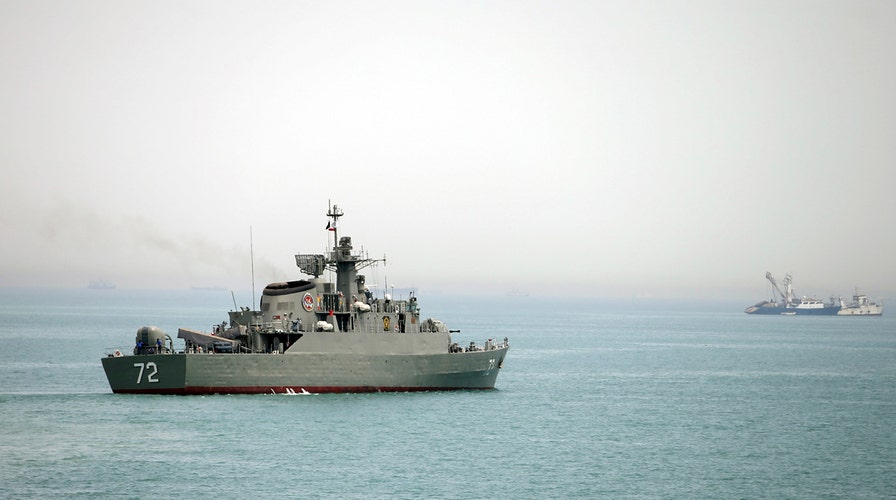Iran threatens to cut off the Strait of Hormuz to the US
National security correspondent Jennifer Griffin reports from the Pentagon
Iran's leaders voiced outrage this week – and even threatened to shut down the Strait of Hormuz -- following a Republican congressman’s proposed legislation seeking a stronger response to Tehran’s recent provocative actions against the U.S. Navy in the Persian Gulf, including the capture of 10 Navy sailors in January.
A senior Revolutionary Guard commander threatened to shut down the entrance to the Persian Gulf, where one-third of the world's oil exports passes each day, after learning about Virginia Rep. Randy Forbes’ bill.
The bill, coming in response to an incident earlier this year in which the Iranian National Guard captured 10 Navy sailors at gunpoint, requires Congress to respond to Iran's recent provocations and rethink sanctions should the incidents continue.
“Americans should learn from historical truths,” Gen. Hossein Salami, deputy commander of Iran’s Revolutionary Guard, said Wednesday.
“If the Americans and their regional allies want to pass through the Strait of Hormuz and threaten us, we will not allow any entry…Americans cannot make safe any part of the world,” he added.
The Supreme Leader of Iran tweeted a cartoon showing Iranian troops kicking the U.S. Navy out of the Gulf.
"They come here from the other side of the globe and stage war games. What are you doing here? Go back to the Bay of Pigs. Go and hold exercises there. What are you doing in the Persian Gulf? The Persian Gulf is our home," Ayatollah Khamenei said this week.
A number of highly provocative incidents between Iran and the U.S. Navy in recent months have captured the world’s attention.
In January,the Iranian Revolutionary Guard forces captured the U.S. Navy sailors when their two patrol boats veered off course. The Iranian captors later released video of the U.S. sailors crying.
Forbes, who chairs the Subcommittee on Seapower on the House Armed Services Committee, weeks ago proposed legislation to punish Iran after learning classified details of the humiliation that the U.S. sailors endured.
“They have now given medals to the people who captured them, and what did the United States do? The United States thanked them for releasing our sailors,” said Forbes in a telephone interview with Fox News.
“We just believe enough is enough. At some point in time, you have to say what they're doing is just wrong and so if the administration won't do it, Congress should,” he added.
In December, Iran fired unguided rockets 1,500 yards from the U.S. aircraft carrier Harry S. Truman transiting the Strait of Hormuz to begin strikes against ISIS. Iran flew a drone over the USS Harry Truman on the same day that the U.S. sailors were captured.
Two weeks after the 10 sailors were captured and released a day later, Secretary of Defense Ash Carter said he was outraged over the incident.
"I was very, very angry at it,” said Carter. “Americans wouldn't have done that.”
Secretary of State John F. Kerry thanked Iran for their treatment of the sailors on the day they were released.
“I’m appreciative for the quick and appropriate response of the Iranian authorities. All indications suggest or tell us that our sailors were well taken care of, provided with blankets and food and assisted with their return to the fleet earlier today.”
Kerry made the comments before Iran released a propaganda video through its state-run TV showing the captured sailors held at gunpoint and in captivity. One sailor was seen crying in the video.
When asked Thursday about the recent threats made by Iran to close one of the world's most vital waterways, Pentagon Press Secretary Peter Cook responded, “Any effort to cut down to somehow shutdown a waterway of critical importance to the global economy is something that we would treat with a great degree of concern.”
Another part of Forbes’s legislation that angered Iran’s leaders is that it refers to the Gulf as the Arabian - not Persian Gulf.
Iran’s recent provocations are only the latest in a string of incidents that date back to the late 1980s.
Last year, Iran seized a Marshall-Islands flagged cargo ship to settle a legal dispute. Iranian gunboats later harassed a number of U.S.-flagged vessels in the Gulf, forcing the U.S. Navy to begin escorts of U.S. and British flagged vessels for a short period of time.
The last time the U.S. Navy fought a battle at sea against another nation was against Iran in 1988 after the frigate USS Samuel B. Roberts struck an Iranian mine and almost sank. Later that day, the U.S. Navy retaliated by attacking six Iranian gunboats and two oil rigs.
In July 1988, a U.S. Navy guided-missile cruiser shot down an Iranian airliner flying from the same airport in Bandar Abas as Iranian military jets engaged in another battle with the US Navy. All 290 aboard were killed. The United States government apologized over the incident, calling it a mistake. Iran said it was a deliberate action.





